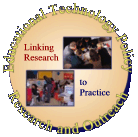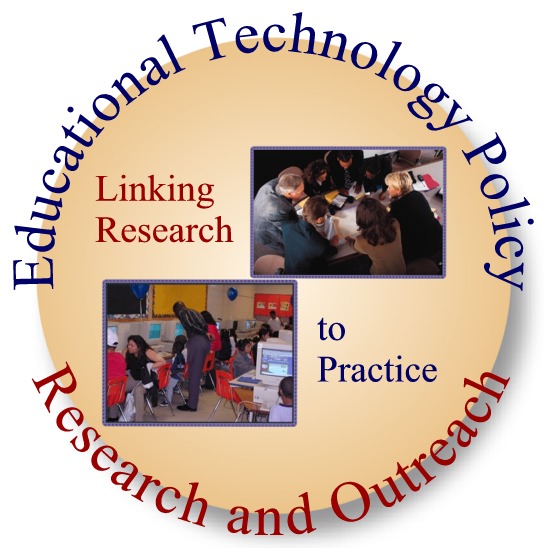Research is a critical part of looking at the effect that technology
has on teaching and learning. The following sites offer many slices
of how technology is being used as a powerful instrument of change
in 21st century schools.
| University
of Maryland Resources |
| Title |
Description |
| College
of Education Research Page |
Information specific to the College of Education
at the University of Maryland. |
| ORAA
Proposal Handbook |
This handbook contains most of the policies and procedures
that relate to sponsored research, service, and training at
The University of Maryland Campus at College Park. It covers
the development, review, and submission of proposals soliciting
such external support, and with the establishment and administration
of sponsored project accounts. |
| ORAA
Homepage |
Office of Research Adminsitration and Advancement
at the University of Maryland has a variety of resources to
help in Grant writing and Proposal development. It also contains
links to many funding sources. |
| UMD Scientific Research
on the Internet |
Resources to further the scientific study of the impact of
the Internet on Societies. Central to this is understanding
the transformative effect—both positive and negative—that
the Internet has on human behavior and how the emerging persistent
behaviors enable and constrain activities, understanding, knowledge,
and culture |
| Qualitative
Research Links |
| Title |
Description |
| A
Method for Constructing Likert Scales |
Research paper tutorial on developing Likert
scales |
| QR
links |
From the Qualitative Report |
| Qualifiers |
A tool for anyone, professional or student, who must assemble,
analyze, evaluate, and organize research data. With Qualifiers
you can collect all your data—text, audio, video—in
one place and arrange it in categories to suit your purpose. |
| The Qualitative
Report |
An online journal dedicated to qualitative research since
1990 |
| Quantitative
Software |
| Title |
Description |
| QSM |
Management tool (for businesses)-can get demo
disc mailed or can download |
| Software
Business products |
Lists of several software products used in "real-life"
but educators could also introduce to students -go to individual
sites to get demo |
| Software
for Survey and Social Survey Analysis |
Navigate to packages--choose from the many-demo's
on each individual website |
| Tools
for e-Research |
Lists of several software products used in
"real-life" but educators could also introduce to
students -go to individual sites to get demo |
| Educational
Technology |
| Title |
Description |
| Annenberg
CPB |
Professional Development Programming for K-12 |
| BLT
Outcomes |
Summary Results of Building Learning with Technology Participants'
Development of Technology Integration Skills Attitudes |
| CARET |
The Center for Applied Research in Educational
Technology bridges education technology research to practice
by offering research-based answers to critical questions. The
site allows you to browse questions and answers, search for
studies, and receive notification of new research related to
your interests. |
| Center for Children &
Technology |
Investigates how technology can make a difference in children's
classrooms, schools and communities. |
| Center For Learning
in Technology |
Theory and research on effective learning
and teaching, and to embody these insights in the innovative
design, use, and assessment of interactive learning environments.
Much of their work is conducted in real educational settings,
such as classrooms and teacher education programs |
Department
of Education Forum on Technology in Education: Envisioning
the Future |
White papers and briefings |
| Doctoral
Dissertation 1997-2001 Educational technology |
Doctoral Research in Instructional Design and Technology:
A Directory of Dissertations, 1977-2001 is a compilation of
doctoral dissertations completed during the calendar years 1977
through 2001. The directory includes listings of each student's
name, graduation year, dissertation title, institution, and
chairperson. This list is cross indexed so that the information
can be retrieved in a variety of ways. |
| ED
Office of Educational Technology |
The U.S. Department of Education's Office
of Educational Technology (OET) develops national educational
technology policy and implements this policy through Department-wide
educational technology programs. |
| Emerging
Technologies for Active Learning - By Susie Metrick and Kristen
Bjork, Education Development Center, Inc. (EDC), and Alan
Epstein, Technology Director, Watertown, MA Public Schools |
Goal of this series was to connect research and practice
by examining emerging tools, research, and initial classroom
experiences; envisioning future uses in schools; and identifying
factors for successful implementation |
| Future of Learning
Group |
Explores how new technologies can enable new ways of thinking,
learning, and designing. The group creates new "tools to
think with" and explores how these tools can help bring
about change in real-world settings, such as schools, museums,
and under-served communities. |
| Human-Computer
Interaction Lab |
Broad range of research in Education, Visualization,
Digital Libraries, Design Process, and Physical Interfaces. |
| Innovations in Online Learning |
Report by the Pew Learning and Technology program.
Looks at 13 online case studies that move beyound "No
significant difference" [Archived
PDF] |
| Journal of Computing in Teacher Education |
|
| Journal of Technology Education |
|
| Journal of Technology Learning and Assessment |
Investigating
Children's Emerging Digital Literacies by Harouna Ba,
William Tally, & Kallen Tsikalas [PDF] |
| Leadership and New Technologies |
Research papers portal
|
| Meridian - A Middle
School Technology Journal |
|
| Mid-continent Research for
Education and Learnaing (McREL) |
Located in Aurora, Colorado, McREL is a nationally recognized,
private, nonprofit organization dedicated to improving education
for all through applied research, product development, and service.
Our longtime clients and customers expect and receive products
and services that are meaningful, affordable, and on target.
|
| Milken
Family Foundation - Education Technology |
The Milken Family Foundation was established
by brothers Lowell and Michael Milken in 1982 with the mission
to discover and advance inventive and effective ways of helping
people help themselves and those around them lead productive
and satisfying lives, including projects in education and technology. |
| National
Patterns of Research and Development Resources: 2003 |
NSF Report |
| No Significant Difference Phenomenon |
The primary purpose of the NSD website is to expand
on the offerings from the book by providing access to appropriate
studies published or discovered after the release of the book.
In addition to studies that document no significant difference
(NSD), the website includes studies which do document significant
differences (SD) in student outcomes based on the mode of education
delivery. |
| North Central Regional Educational
Laboratory NCREL |
The North Central Regional Educational Laboratory (NCREL)
is a wholly owned subsidiary of Learning Point Associates. As
a member of the Regional Educational Laboratory Network, NCREL
is dedicated to providing high-quality, research-based resources
to educators and policymakers in the states of Illinois, Indiana,
Iowa, Michigan, Minnesota, Ohio, and Wisconsin.
For additional resources, visit Learning Point Associates
|
| Office
of Educational Technology (OET) |
Recommend policies to promote increased use
of technology and technology planning throughout all programs
and training functions administered by the Department of Education. |
| PBS
Teacher Source Portal |
A growing body of research on educational technology provides
valuable guidance for district technology planning, professional
development, and classroom integration. In the meantime, however,
the following links will guide you to some of the "latest
and greatest" in educational technology research studies
available online. |
| People
in IT |
Split by subject |
| Preparing
for the Revolution: Information Technology and the Future of
the Research (2002) |
Reflecting their broad interest in the health
of America’s research enterprise, the National Academies
launched a study in early 2000 on the implications of information
technology for the future of the nation’s research university—a
social institution of great importance to our economic strength,
national security, and quality of life. |
| Regional Educational
Laboratories |
The nation's network of support for research-based school
reform including educational technology. |
| Research Priorities in Educational Technology: A Delphi Study
[PDF] |
This is a study I participated in |
| Rheingold's
Brainstorms: Disinformation Superhighway? |
by Luciano Floridi |
| School
Technology Leadership Research and Assessment Blog |
|
| SETDA |
The principal association representing the state directors
for educational technology. SETDA promotes national leadership
in educational technology to support achievement in lifelong
learning, provides professional development for state educational
technology directors and builds partnerships to advance learning
opportunities and improve student achievement through technology.
|
| Teaching,
Learning & Computing Research Group |
|
| Technology
Innovation Challenge Grants (TICG) |
Large-scale implementations of educational technology funded
by the U.S. Department of Education’s Office of Educational
Research and Improvement |
| Thornburg Center |
Features access to resources from many of the great minds
in the field of educational technology. |
| UK
Catalogue of Internet Resources: |
Educational technology research |
| Virtual
Teaching in Higher Education: The New Intellectual Superhighway
or Just Another Traffic Jam? |
Jerald G. Schutte |
| WestEd |
Projects that promote the power of educational networks and
that focus on improving technology use by disadvantaged schools
and students. |
| What
Does Research Tell Us About Technology and Higher Learning?
|
Stephen C. Ehrmann, Ph.D |
| WHO'S
WHO IN INSTRUCTIONAL TECHNOLOGY ? |
PURPOSE: To provide a node of contact, not to duplicate biographies
available elsewhere on the Internet. |
| Dissertation |
| Title |
Description |
| Betrayed by your advisor |
Article in the Chronicle of Higher Ed, on characteristics
of dead-end
dissertations |
| Making Room for Baby |
In an effort to increase the number of women pursuing advanced
degrees, Stanford University has adopted a new policy that
administrators say “is designed to partially ameliorate
the intrinsic conflict between the ‘biological’ and
the ‘research’ and ‘training’ clocks
for women graduate students.” |
| Scholars Before Researchers:
On the Centrality of the Dissertation
Literature Review in Research Preparation |
by David N. Boote and Penny Beile [Archived
PDF] |
| Three Magic Letters:
Getting to Ph.D. |
Drawing on the largest survey of doctoral students ever conducted,
Three Magic Letters provides a compelling portrait of the graduate
school experience and identifies key issues affecting the success
and failure of doctoral students |
| Why Grad Students Succeed or Fail |
Article from Inside Higher Ed |
| Digital
Recording and Transcribing |
| Title |
Description |
| Audacity |
Converts your tapes to WAV sound files |
| Express
Scribe Transcription Playback Software |
Express Scribe is professional audio player
software designed to assist the transcription of audio recordings.
It is installed on the typist's computer and controlled using
the keyboard (with 'hot' keys) and / or can be used with a
transcription pedal. This computer transcriber application
features variable speed wave playback, foot pedal operation,
file management and more. This program is free. |
| Free Hi-Q Recorder |
Converts tapes to MP3 sound files. Very easy to use |
| The Observer |
The Observer is the professional software package for the
collection, analysis and presentation of observational data. |












